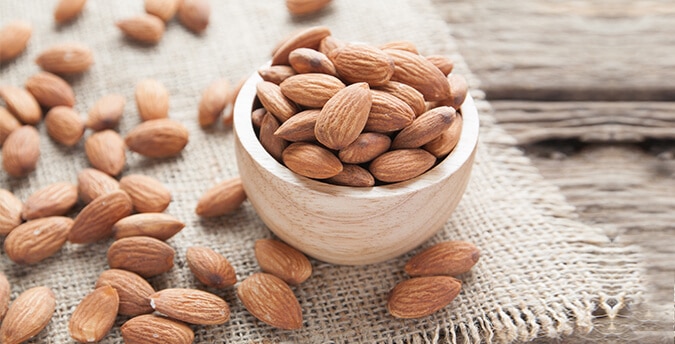Can Dogs Eat Almonds?

We usually discourage begging. And for sure you should always get your furry friend to respect meal times and not try to blackmail yourself or other family members into slipping him treats with their adorable puppy eyes. But whether because of curiosity or simply a feeling of camaraderie, we sometimes slip our canine companions human food. However, always keep in mind that dogs’ digestive systems are not like humans and treats that are harmless and delicious to us can cause real damage in a dog.
That’s why it’s always important to check with your vet or a reliable source whether it’s okay to feed your dog a certain item. Today, we’re covering whether or not almonds are safe for your pooch, why or why not.
Unfortunately almonds are not suitable food for dogs. In fact many nuts are toxic to dogs as their system is not able to properly process them. Many are essentially poison. However, as we know, just because something is bad for you, doesn’t mean you don’t want it. And so, your dog might not be on board with being refused almonds. He actually likes the taste.
Our advice is to make sure to keep almonds out of the reach of your pooch and if you suspect that he might have ingested some be on the lookout for certain signs of poisoning such as vomiting, diarrhea, lethargy or other signs of discomfort.
As for why almonds as well as other nuts are not great for your dog this has to do with two main problems that this food causes in canines.
First of all, almonds, and nuts in general, are high in fats which is great for humans who are very well adapted for processing fat and using it as fuel. However, dogs do not share this adaptation. Their evolution gears heavily towards protein and even animal fat can be damaging for them. Almonds pose a serious risk of pancreatitis which requires immediate veterinary attention for your animal.
Second of all, almonds pose a significant risk for various types of obstructions. They can become logged in their intestines or even in their esophagus or windpipe if you’re talking about a smaller breed. These sorts of problems require emergency care as they can be fatal. Sometimes, surgery is necessary in order to remove the obstruction. So be careful!
Last but not least, beware the coated almonds. While raw almonds are a hazard in themselves, chocolate covered almonds or salted ones will cause a whole different type of problem. From stomach problems to salt toxicity, these sorts of toppings are not something that a dog’s biology will take kindly to.
So, that’s a definite NO on the almonds.
If your dog does end up consuming some by mistake try to find out the quantity. Monitor her closely in the next hours to see if she exhibits any sign of obstruction or other health problems and give your vet a call to get extra advice on how to proceed and what to watch out for.
